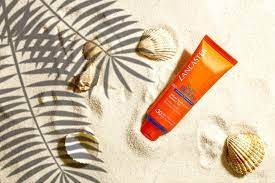How To Choose An SPF Product For Dry Skin
Dealing with dry skin can make it difficult to choose skincare products that work well. When dealing with SPF, it’s important to get an effective product that doesn’t make dry skin worse and feels comfortable on the skin (so that you’ll actually want to use it every day!).
Thankfully, there are many different formulas of SPF products out there to choose from these days. You should be able to find a product that works for you with ease as long as you know what ingredients and qualities you’re looking for.
Chemical Or Mineral?
The two main types of SPF products are chemical and mineral.
Mineral sunscreen works by creating a thin coat of zinc oxide and titanium oxide on the skin. It absorbs and reflects much of the sun’s harmful rays, preventing both UVA and UVB light from getting into the skin.
Chemical sunscreen absorbs into the skin and relies on chemical reactions between the UV rays of the sun and the sun-absorbing chemicals in the sunscreen to prevent damage. The chemicals in the sunscreen absorb the UV rays and create heat, which exits the skin back into the air.
When looking for a chemical sunscreen, make sure you choose one that is specifically broad-spectrum. Some chemicals block UVA and some block UVB; a combination of both is needed for quality SPF.
For dry skin, a good safe bet is to use mineral sunscreen. This type of product tends to have a more moisturising effect because it creates a coating on the skin that can help reduce the drying effect of the sun.
Zinc oxide in particular is a great way to protect the skin’s moisture barrier, and can even promote the healing of small wounds!
Many of the ingredients in a typical chemical sunscreen tend to have a drying effect on the skin in order to not leave a greasy residue.
While mineral sunscreen can leave a whitish sheen or a greasy feeling on the skin, there are so many formulations now that are designed to mitigate those effects. You can find tinted formulas which are especially helpful for darker skin tones. Many are also formulated so that the SPF can be spread all over the skin with ease, and then the “greasiness” dissipates, leaving a satiny finish.
Other Ingredients To Look For
Fortunately, many makers of skincare products and sunscreen realize the need for a multi-purpose product. There are so many different kinds of sunscreens to choose from for your skin type, activity, and for the face vs the body.
The best sunscreen for dry skin will not only contain at least 30 SPF with zinc oxide and titanium oxide, and it will also have hydrating elements like aloe, jojoba oil, grapeseed oil, panthenol, vitamin e, hyaluronic acid, almond oil, soybean oil, apricot oil, glycerin, and ceramides (found in many natural oils like jojoba oil).
If you’re applying sunscreen as part of a daily makeup routine, look for something lightweight that will not leave a white cast, is non-comedogenic, and is designed to not budge as the day goes on. You can find powder or spray SPF that is designed to be reapplied on top of makeup for a refresh in your sun protection all day long. Many cream or liquid SPFs can also be blotted on top of a finished makeup look throughout the day without leaving noticeable residue behind.
For the body, it is generally a little less imperative to have something that can seamlessly be applied over makeup. You can still find plenty of non-greasy SPF available in more affordable formulations to use over a wider area of the body (facial SPF tends to be more expensive, so you definitely don’t want to use it for your body!). Look for the same moisturising ingredients and make sure it’s something that you will apply throughout the day!
If you’re going to be at the beach or doing an activity that will make you sweat, you will also need to find a formula that is water-resistant and safe for the environment, as some SPF ingredients are toxic to fish and other wildlife.
Ingredients To Avoid
For dry skin, you’ll need to avoid certain ingredients in some SPF products that can worsen dryness. These ingredients are intended to provide a non-greasy feeling that is suitable for oily and normal skin but can be irritating to dry skin in particular. Chemical SPF ingredients that absorb into the skin may cause irritation and dryness.
Aminobenzoic acid and trolamine salicylate should always be avoided because they are proven to be toxic.
If you have dry skin, sunscreen is still a must in your everyday routine. Unfiltered sun exposure can make dry skin worse because it evaporates moisture and damages the cells over the long term. Maintain healthy skin by remembering to apply and reapply non-toxic, non-comedogenic SPF throughout the day!



